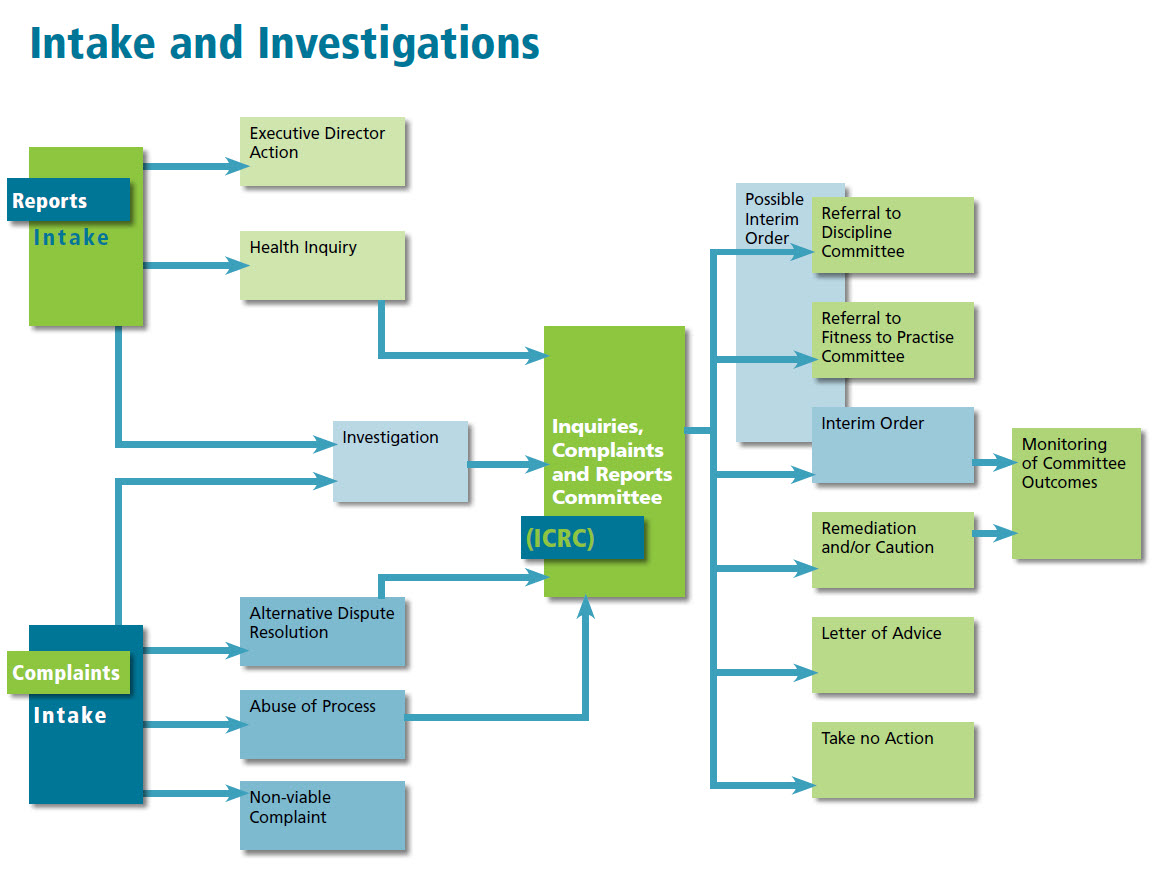
View as PDF
What must be reported?
Facility operators at organizations where nurses practice are required to report to CNO when there is reason to believe that a nurse has sexually abused a patient, or is incompetent, or incapacitated.
Employers are required to report the termination of, or the intent to terminate, employment or privileges for reasons of professional misconduct, incompetence or incapacity.
Reporting ensures that CNO is alerted if there is a concern that a nurse is not practising safely. It allows CNO to take action to protect the public.
The Reporting Guide for more details on mandatory reporting obligations and potential outcomes.
File a report now if you have concerns related to a nurses professional conduct or capacity.
What happens when a report is received?
When CNO receives a report from an employer or facility operator, an initial investigation is completed. With your report, CNO can evaluate the level of risk associated with the nurse's behaviour and take the appropriate steps to protect the public. Information gathered from the initial investigation, and the results of the risk tool, are reviewed by CNO’s Executive Director along with any information about the nurse CNO may have previously received. Based on this information, the Executive Director determines an appropriate regulatory response.
Not every report results in a formal investigation. Other outcomes can include a member’s formal agreement that they will comply with certain terms, a meeting with a CNO representative or Executive Director, or a direction for the nurse to engage in specific remedial activities that address the gap in practice.
Executive Director Investigations
The Executive Director will appoint an investigator after determining there are reasonable and probable grounds to believe that a member has committed an act of professional misconduct or is incompetent. CNO’s Investigations Process Guide provides detailed information about this type of investigation and the role of the investigator.
A CNO investigator may contact an employer during an investigation to request documentation or to obtain information through a witness interview. The types of documents typically requested include health records, facility policies and procedures, audit trails and internal investigation documentation. Employers and other witnesses to the incident, which may include employees, may be interviewed to provide both general practice setting information and specific information on the issues raised in the complaint. Anyone who is interviewed are expected not to discuss the incident(s) with one another.
All components of the investigation are kept confidential because this is required by our legislation.
CNO health inquiries
A facility operator must provide a written report to CNO when there are concerns about a nurse’s ability to practice safely as a result of a possible physical or mental condition or disorder.
The Health Inquiry and Fitness to Practise processes fact sheet explains the processes.
Complaints
The public has the right to express their concerns to CNO about nurses and, by law, CNO must respond to every complaint received about nursing care.
Certain types of complaints can be resolved using an alternative dispute resolution (ADR) process. This is a process where the person who made the complaint, the nurse and CNO come to an agreement to resolve a concern. When the complaint is inappropriate for ADR or if the resolution is unsuccessful, the complaint goes through the investigation process.
Please read CNO’s Addressing Complaints: Process Guide for detailed information about how CNO handles complaints.
File a complaint now if you have concerns related to a nurse's professional conduct.
Complaints investigation
The scope of a complaints investigation is defined by the issues and concerns identified in the complaint. CNO’s Investigations Process Guide describes the process by which information is received, assessed and investigated.
Similar to the reports investigation, a CNO investigator may contact an employer during the complaints investigation to request documentation or to obtain information through a witness interview. The types of documents typically requested include health records, facility policies and procedures, audit trails and internal investigation documentation.
Employers may be interviewed to provide both general practice setting information and specific information on the issues raised in the complaint.
Confidentiality considerations
Information related to a CNO complaint or report is kept confidential in accordance with legislation. A CNO investigator will contact an employer if more information is required. Employers are expected to keep the details of all correspondence with the investigator confidential.
Inquiries, complaints and reports committee
The Inquiries, Complaints and Reports Committee (ICRC) reviews public complaints and reports of concern about nurses’ practice, conduct or health.
Read the ICRC web page to learn more about:
- Specified Continuing Remediation and Education Programs
- Remediation Program and Caution Orders
- Referrals to other statutory committees
- Interim Orders
- Committee members
- Year-end report